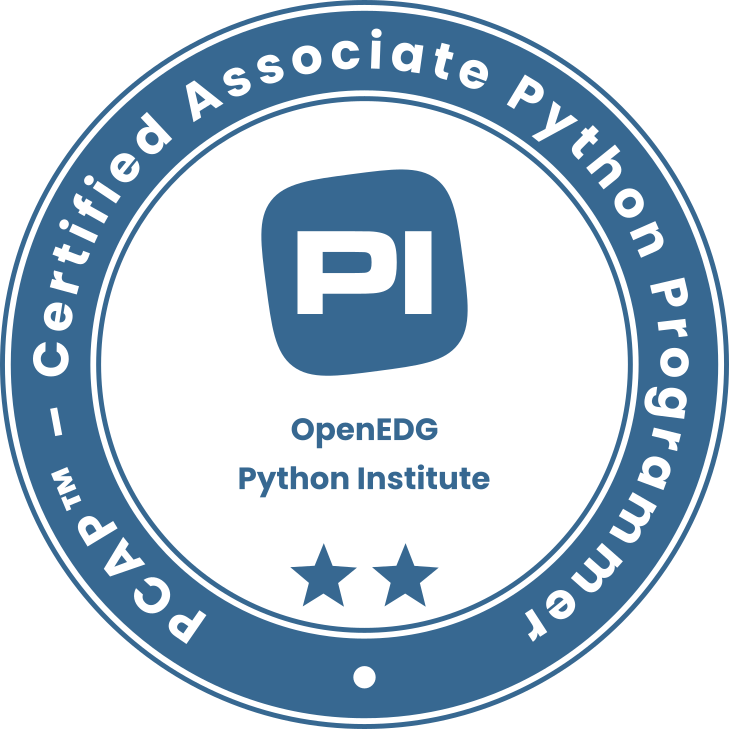
PCAP™ - Certified Associate in Python Programming
Ziele
Diese 5-tägige Schulung bereitet Sie auf die "PCAP™ - Certified Associate in Python Programming" Prüfung vor. Es deckt alle wesentlichen Module und Praktiken ab, die für die Prüfung erforderlich sind, einschließlich Modulen und Paketen, Ausnahmebehandlung, Zeichenkettenmanipulation, objektorientierter Programmierung und verschiedenen fortgeschrittenen Python-Konzepten wie List Comprehensions und Lambdas.
Zielgruppe
- Entwickler
Voraussetzungen
Für eine optimale Teilnahme am Kurs empfehlen wir folgende Vorkenntnisse:
- Teilnahme am Seminar Python Einführungskurs oder vergleichbare Kenntnisse
- Teilnahme am Seminar PCEP - Certified Entry-Level Python Programmer oder vergleichbare Kenntnisse
Lernmethodik
Die Schulung bietet Ihnen eine ausgewogene Mischung aus Theorie und Praxis in einer erstklassigen Lernumgebung. Profitieren Sie vom direkten Austausch mit unseren projekterfahrenen Trainern und anderen Teilnehmern, um Ihren Lernerfolg zu maximieren.
Agenda
Section 1: Modules and Packages
-
PCAP-31-03 1.1 – Import and use modules and packages
- Import variants: import, from import, import as, import *
- Advanced qualifying for nested modules
- The dir() function
- The sys.path variable
-
PCAP-31-03 1.2 – Perform evaluations using the math module
- Functions: ceil(), floor(), trunc(), factorial(), hypot(), sqrt()
-
PCAP-31-03 1.3 – Generate random values using the random module
- Functions: random(), seed(), choice(), sample()
-
PCAP-31-03 1.4 – Discover host platform properties using the platform module
- Functions: platform(), machine(), processor(), system(), version(), python_implementation(), python_version_tuple()
-
PCAP-31-03 1.5 – Create and use user-defined modules and packages
- Idea and rationale
- The pycache directory
- The name variable
- Public and private variables
- The init.py file
- Searching for/through modules/packages
- Nested packages vs. directory trees
Section 2: Exceptions
-
PCAP-31-03 2.1 – Handle errors using Python-defined exceptions
- Except variants and exception hierarchy
- Raise, raise ex
- Assert
- Event classes
- Except E as e
- The arg property
-
PCAP-31-02 2.2 – Extend the Python exceptions hierarchy with self-defined exceptions
- Self-defined exceptions
- Defining and using self-defined exceptions
Section 3: Strings
-
PCAP-31-03 3.1 – Understand machine representation of characters
- Encoding standards: ASCII, UNICODE, UTF-8, code points, escape sequences
-
PCAP-31-03 3.2 – Operate on strings
- Functions: ord(), chr()
- Indexing, slicing, immutability
- Iterating through strings, concatenating, multiplying, comparing (against strings and numbers)
- Operators: in, not in
-
PCAP-31-03 3.3 – Employ built-in string methods
- Methods: .isxxx(), .join(), .split(), .sort(), sorted(), .index(), .find(), .rfind()
Section 4: Object-Oriented Programming
-
PCAP-31-03 4.1 – Understand the Object-Oriented approach
- Ideas and notions: class, object, property, method, encapsulation, inheritance, superclass, subclass, identifying class components
-
PCEP-31-03 4.2 – Employ class and object properties
- Instance vs. class variables: declarations and initializations
- The dict property (objects vs. classes)
- Private components (instances vs. classes)
- Name mangling
-
PCAP-31-03 4.3 – Equip a class with methods
- Declaring and using methods
- The self parameter
-
PCAP-31-03 4.4 – Discover the class structure
- Introspection and the hasattr() function (objects vs classes)
- Properties: name, module, bases
-
PCAP-31-03 4.5 – Build a class hierarchy using inheritance
- Single and multiple inheritance
- The isinstance() function
- Overriding
- Operators: not is, is
- Polymorphism
- Overriding the str() method
- Diamonds
-
PCAP-31-03 4.6 – Construct and initialize objects
- Declaring and invoking constructors
Section 5: Miscellaneous
-
PCAP-31-03 5.1 – Build complex lists using list comprehension
- List comprehensions: the if operator, nested comprehensions
-
PCAP-31-03 5.2 – Embed lambda functions into the code
- Lambdas: defining and using lambdas
- Self-defined functions taking lambdas as arguments
- Functions: map(), filter()
-
PCAP-31-03 5.3 – Define and use closures
- Closures: meaning and rationale
- Defining and using closures
-
PCAP-31-03 5.4 – Understand basic Input/Output terminology
- I/O modes
- Predefined streams
- Handles vs. streams
- Text vs. binary modes
-
PCAP-31-03 5.5 – Perform Input/Output operations
- The open() function
- The errno variable and its values
- Functions: close(), .read(), .write(), .readline(), readlines()
- Using bytearray as input/output buffer
Hinweise
Prüfung und Zertifizierung
Die Prüfungsgebühr ist nicht im Preis enthalten.
Informationen zur Prüfung
- Exam name: PCAP™ - Certified Associate Python Programmer
- Exam Code & Current Exam Versions: PCAP-31-03
- Pre-requisites: None
- Validity: Lifetime
- Exam Duration: Exam: 65 minutes, NDA/Tutorial: 10 minutes
- Number of Questions: 40
- Format: Single- and multiple-select questions
- Passing Score:70%
- Languages: English
- Delivery Channel: Pearson VUE
Open Badge - Ihr digitaler Kompetenznachweis

Durch die erfolgreiche Teilnahme an einem Kurs bei IT-Schulungen.com erlangen Sie nicht nur Fachkenntnisse und Fähigkeiten, sondern bekommen zusätzlich zu Ihrem Teilnahmezertifikat ein Open Badge als digitalen Nachweis Ihrer Kompetenz.
Sie können diesen in Ihrem persönlichen und kostenfreien Mein IT-Schulungen.com Konto abrufen. Ihre verdienten Badges lassen sich problemlos in sozialen Netzwerken integrieren und weitergeben.
Kurz vor Durchführung
| Termin | Standort | Aktion |
|---|---|---|
| 13.05. - 17.05.2024 | Hamburg | |
| 17.06. - 21.06.2024 | München | |
| 15.07. - 19.07.2024 | Köln | |
| 12.08. - 16.08.2024 | Nürnberg |







 Sie haben in Ihrem Browser Javascript deaktiviert! Bitte aktivieren Sie Javascript um eine korrekte Darstellung und Funktionsweise von IT-Schulungen zu gewährleisten.
Sie haben in Ihrem Browser Javascript deaktiviert! Bitte aktivieren Sie Javascript um eine korrekte Darstellung und Funktionsweise von IT-Schulungen zu gewährleisten.